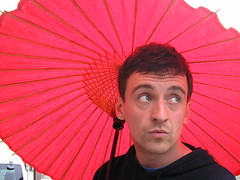The English Engine
Nobody could accuse the Japanese of not being thorough. Many are the fables that describe the rigorous discipline of Samurai who, it's said, would practice drawing their sword in the correct manner for an entire year before learning how to actually use it.
This meticulous (and sometimes infuriating) attitude is evident in language education, which centres around choral drilling, or constant repetition of set words and phrases.
One upshot of this is that most English students here have an incredible vocabulary, but not necessarily the skills, confidence or opportunity to use it in natural conversation. Those who do, tend to have a repertoire of McSpeech - words like "really?" or phrases such as "how about you?", harmless in of themselves, but dropped in regularly to establish a casual mood, seem over-rehearsed and at worst, insincere.
That said, sounding natural in a tongue so different from your own is no mean feat. The Japanese language itself is made up of particles that set the tone of conversation, respectful language for your superiors, casual for your peers or subordinates. Even with my shaky grasp, I can see that it's an incredibly formulaic language, some "conversations" being nothing more than a repeated ritual. Erik, another ALT, has pointed out that during interviews for places at University, where, grades aside, personality would be the deciding factor, in Japan it's down to how well the applicant has memorised the procedure/ritual for presenting themselves. Perhaps all these factors, combined with the Japanese approach to tasks, is what creates the daunting mechanics of the English lesson.
This week, I've been working with the very model of a Japanese teacher. The man is a machine, probably fulfilling the dream of a chap that Matt & I met in Shinjuku, whose parting words to us were
"I want to be a walking dictionary."
For the sake of tact (and because I like him) this teacher will remain nameless. When I first met him, he impressed me with his detailed teaching plans, the pace with which they were executed and his quietly intense, but approachable classroom presence. Now he scares me a little bit. He's the quintessential Japanese workaholic, the product of a near automated education system. He looks like a well preserved forty-something. He is in fact my age.
In Pictures from the Water Trade, John David Morley's character decides to leave Japan, when after inadvertently bowing to someone on the phone, he feels that he is losing touch with himself. Whilst I'm a long way off doing that, I had such a moment in this teachers class last week.
On bad days, my job is that of a human tape recorder. The prescribed, correct way of speaking English requires a rising intonation at the end of a question, exaggerated in class in order to get this (not totally alien) point across. The problem is, a solid year of repeating pretty much the same questions has resulted in my delivering them like a command, in an attempt to actually get a response from the students. My rising intonation is imperceptible sometimes, thus when I'm demonstrating how to ask a question for the new first years, I find I can't do it, and concentrating only makes it worse or weird. Funny that the wonky cog in the English Engine should be the resident native speaker.

Labels: culture (shock), I wasn't expecting that, Japan, language, school, teaching, that job they make me do



5 Comments:
You are becoming borg!
Who did that to you? Or are those the inner workings of the human tape recorder?
You said it right! To Japanese, learning is more than gaining knowledge. It is attitude-building through perfecting forms...
So it is often said that Japanese professional classical musicians are extremely skilled but their music does not have soul...
Anyway, the educational system of Japan was designed to catch up with more advanced industrial nations by producing legions and legions of factory workers and bureaucrats... I guess it's time they designed a new one.
Never seen any classical musicians in Japan, but I saw some jazz in Asakusa - technically superb (especially the clarinet player) but lacking something fiery. The same goes for a troupe of dancers I saw at an Irish music night the other week - in step, vigorous, energetic...with the most serious expressions on their faces. Wasn't sure if they were having fun or not.
No. Fun is one of cardinal sins... ;) Fun is not that important for Japanese. The most important thing is gain after pain.
If you want to know more about my falks, watch a baseball cartoon from the 1960s titled "Kyojin no Hoshi." It is highly praised cartoon but the main character is mere a puppet of his father, who is nothing but a child abuser...
Post a Comment
<< Home